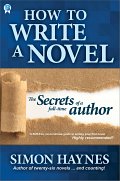How to beat writer's block
If I get stuck writing a short story, I just give up and start another one. I have a folder with over 100 unfinished shorts in, and I'm telling you how to defeat writer's block!
Getting blocked is much more serious when it comes to novels. You may have invested weeks, months or years in this thing, and giving up now is simply not an option.
So, when I get stuck for ideas or feel the whole book is a waste of effort, here's what I do. (I use my
writing software, but paper will do.)
First, create blank chapter headings for the next few chapters.
Now add 2 or 3 blank scenes to each. Don't worry about how long these are going to be, or whether you need one or four of them per chapter. You're just showing your brain the small steps involved.
Starting at the blocked chapter, jot down one-line description for the blank scenes. You're just filling empty spaces right now, so it doesn't have to be amazingly exciting.
As you progress you might find yourself moving away from your plot. If it's more interesting - good. (Writer's block is usually the result of trapping your characters in a dead end.)
Suddenly you will write down a scene description which makes fanfares sound, bells ring, etc. You KNOW how this one goes! Don't write it immediately, just write more detailed notes for it. Over the next day or two it will stick in your mind, and you'll be able to refine it. Hold yourself back and don't write it yet. If you like you can stop outlining other scenes now. Instead, go away and play this vivid scene through your mind. If you're itching to write it down... well, there goes the writer's block ;-) Never forget this: You're writing a novel, not reading one. What happens next is completely in your hands, but it's this freedom which can make you freeze like a rabbit in the headlights. Do you leap left or right?
When you sit down to write this stand-out scene it may not be as grand as it was in your imagination. Don't worry, that grandness will come after multiple revisions. You will probably rewrite the whole thing several times before your book is complete - and this article was about unblocking the creative juices, not writing a first draft which just happens to be the best novel the world has ever seen.
After you've written that stand out scene (SOS) you can go back to modify the scene descriptions leading up to it, perhaps adding references to events in the SOS. As you're rewriting these descriptions you will come across one which rings bells, sounds fanfares, etc. That's the next one you should focus on.
The moral of the story is ... write scenes which are busting to get onto the page, and skip the ones which seem like a chore. If you're bored out of your skull writing them, how's your reader going to feel? Another tip: there's no need for long, boring transition scenes. For example, you have a character in London who needs to travel to Sydney. Unless something happens on the plane, you can end the London scene by hailing a cab for the airport. Then you can start the next with a quick mention of Sydney, just to orient the reader. Use the same trick on any other boring parts and your novel will fly along... and so will you.
Please remember that none of my articles are meant to discourage. In fact, they're all written for the me of ten years ago, the writer who was ready to take the next step but didn't know what that step was.
About the author: Simon Haynes is the author of over 25 novels. He also designed and created
yWriter.
Stay in touch!
Follow me on
Facebook or Twitter
